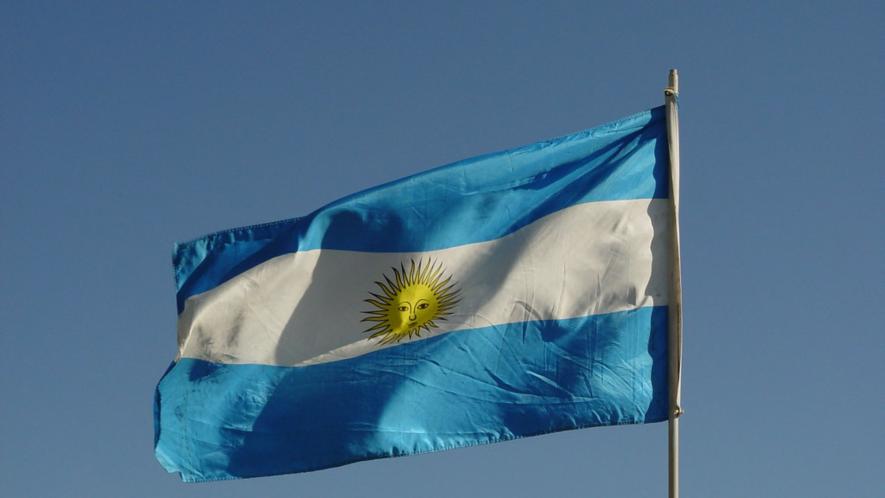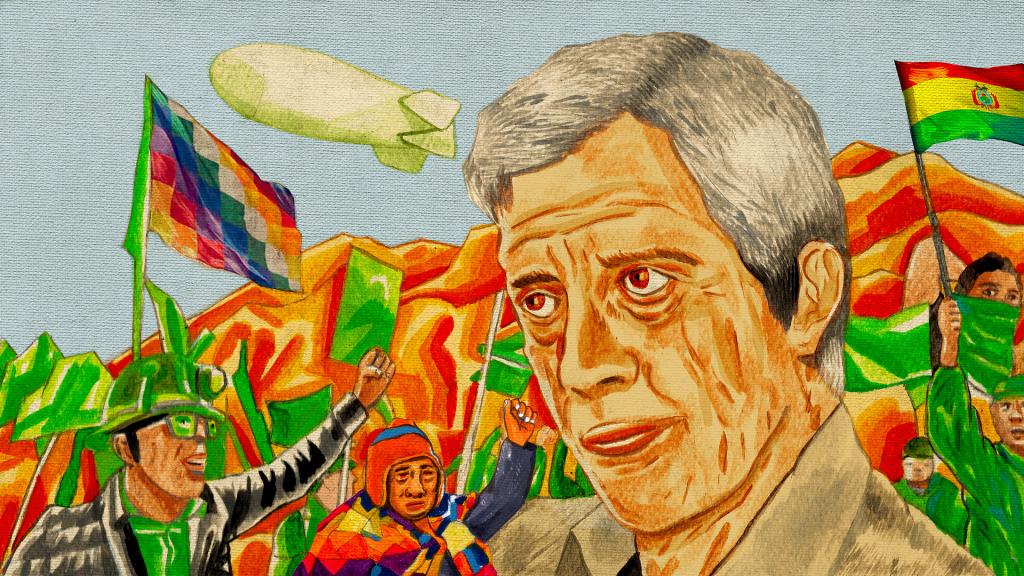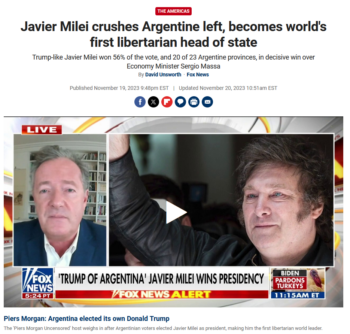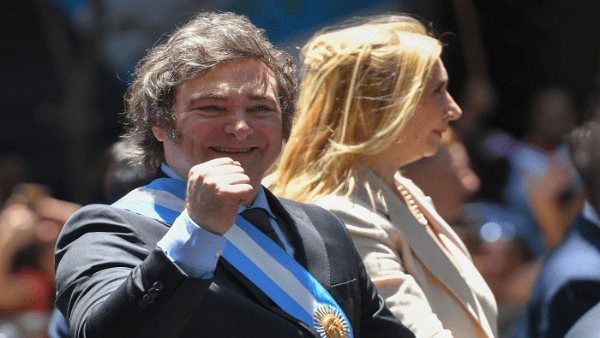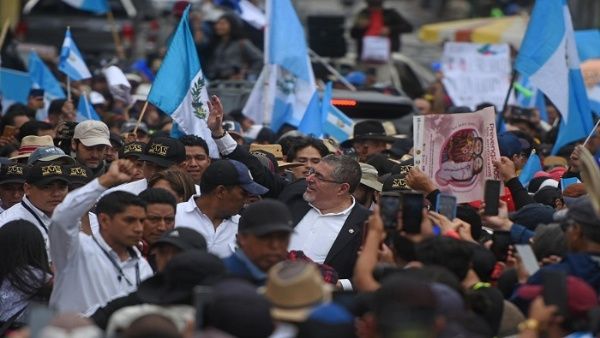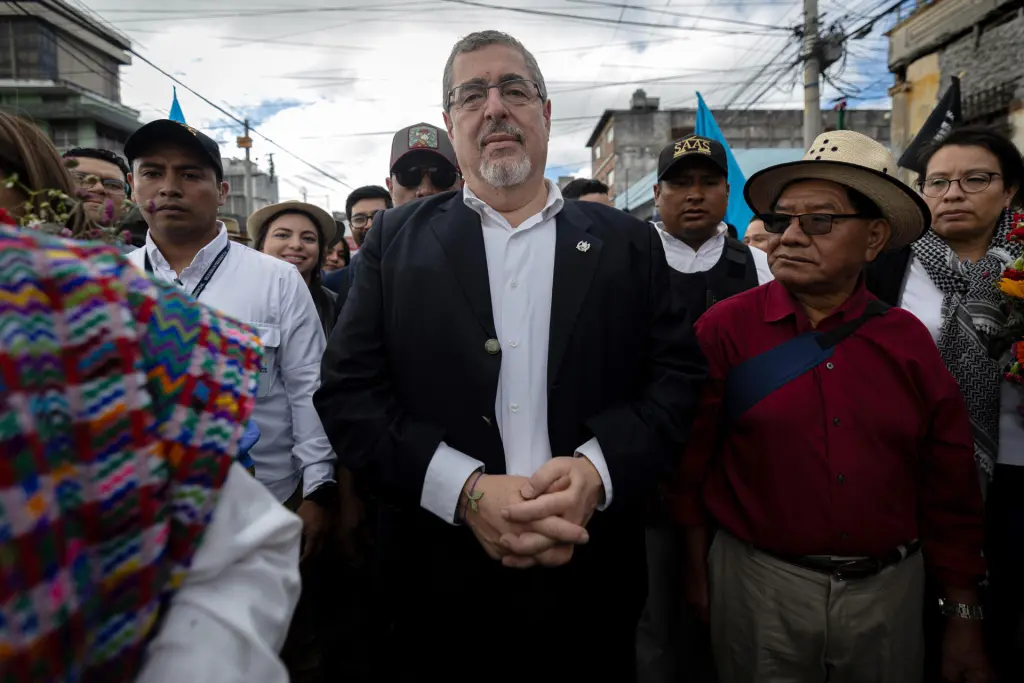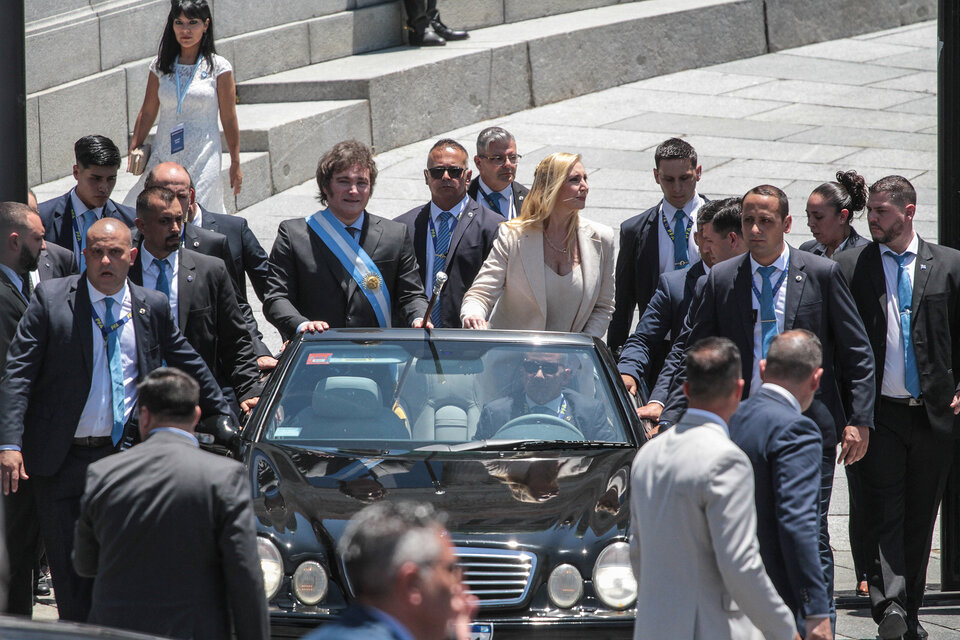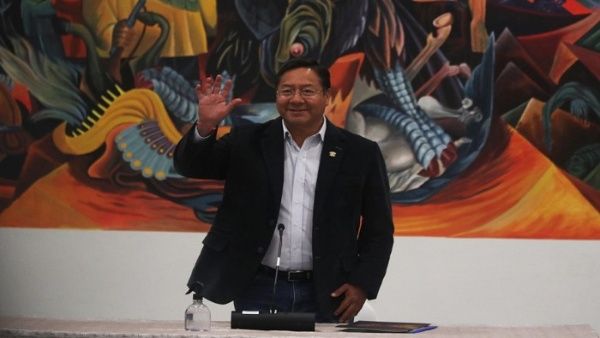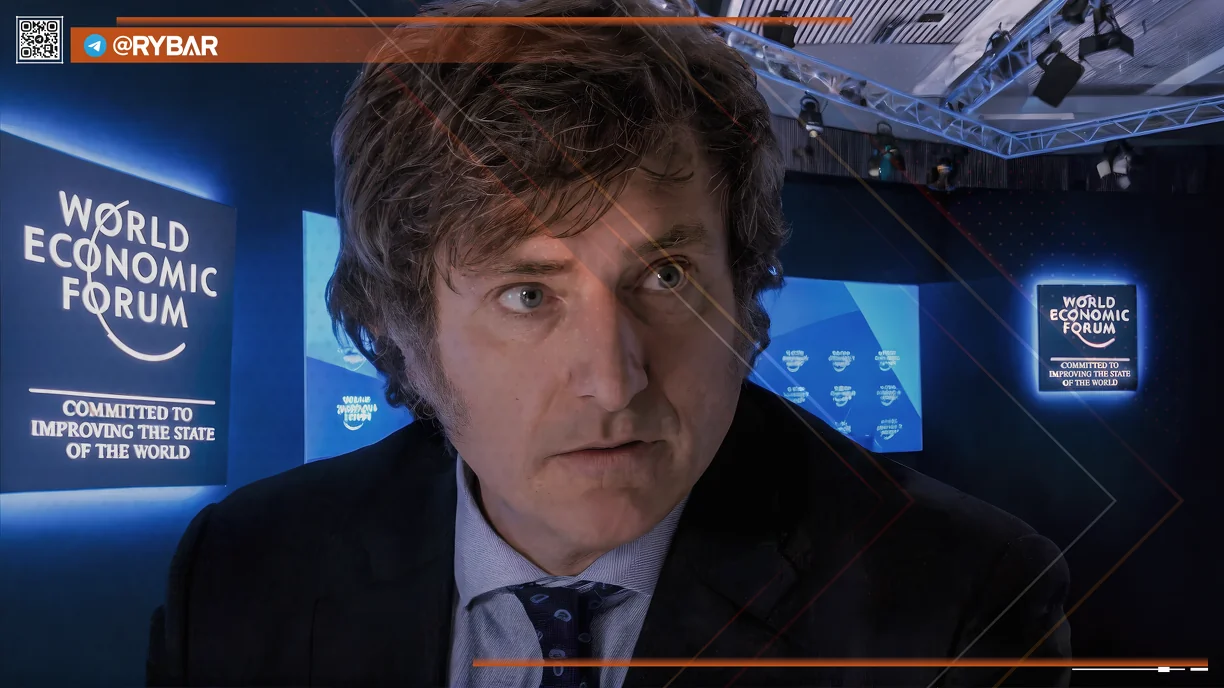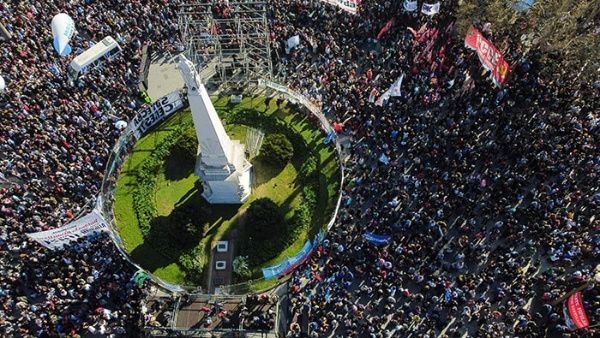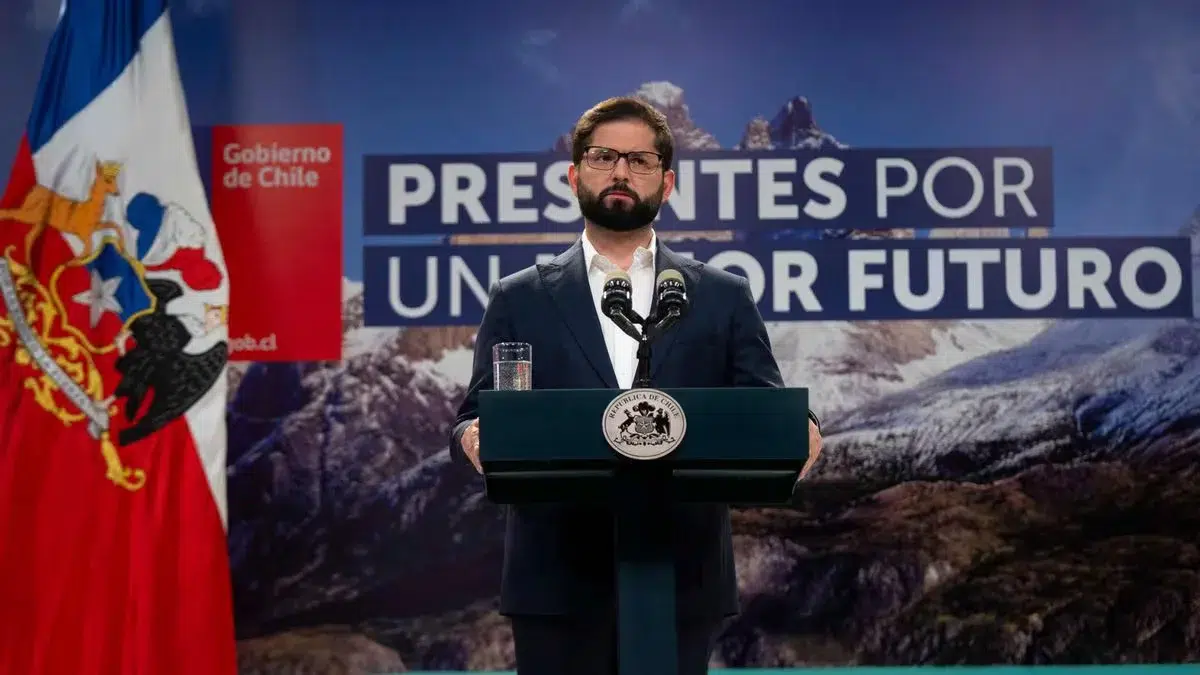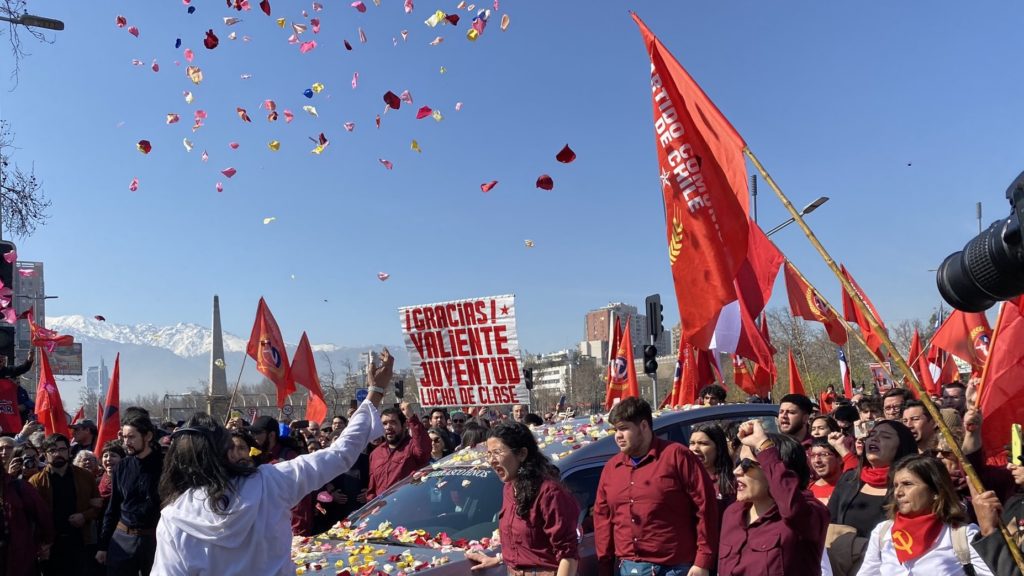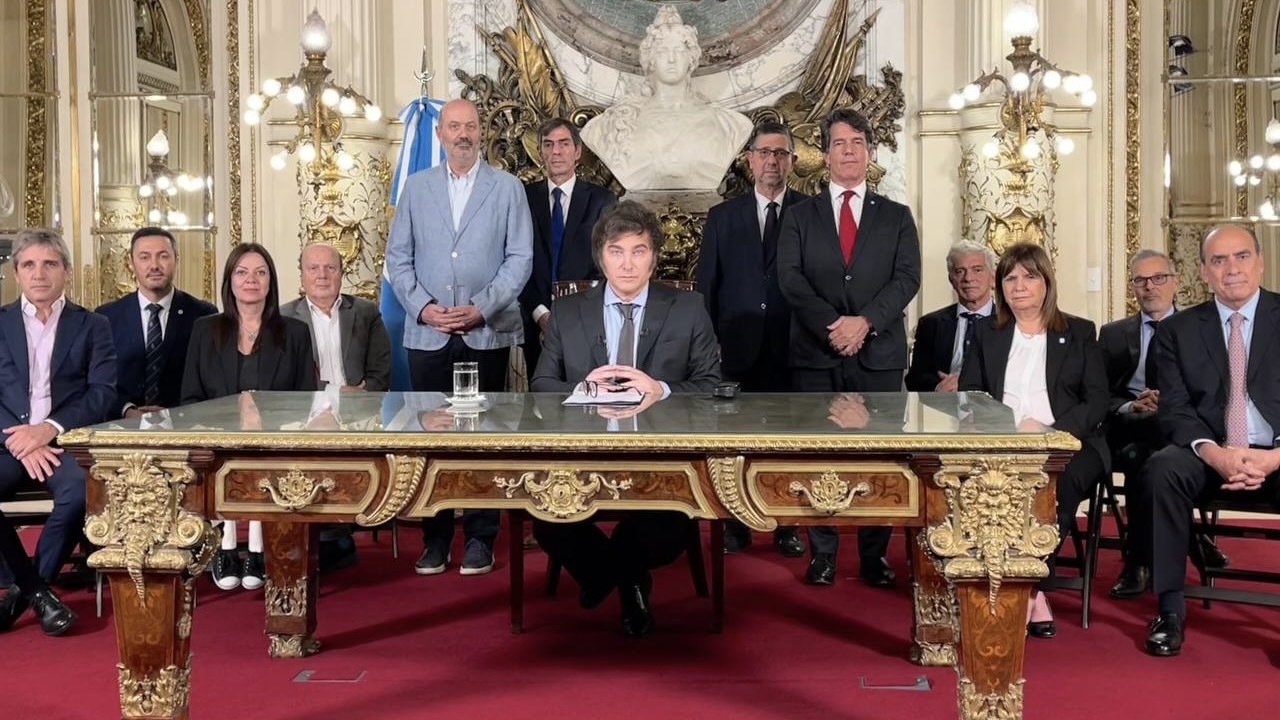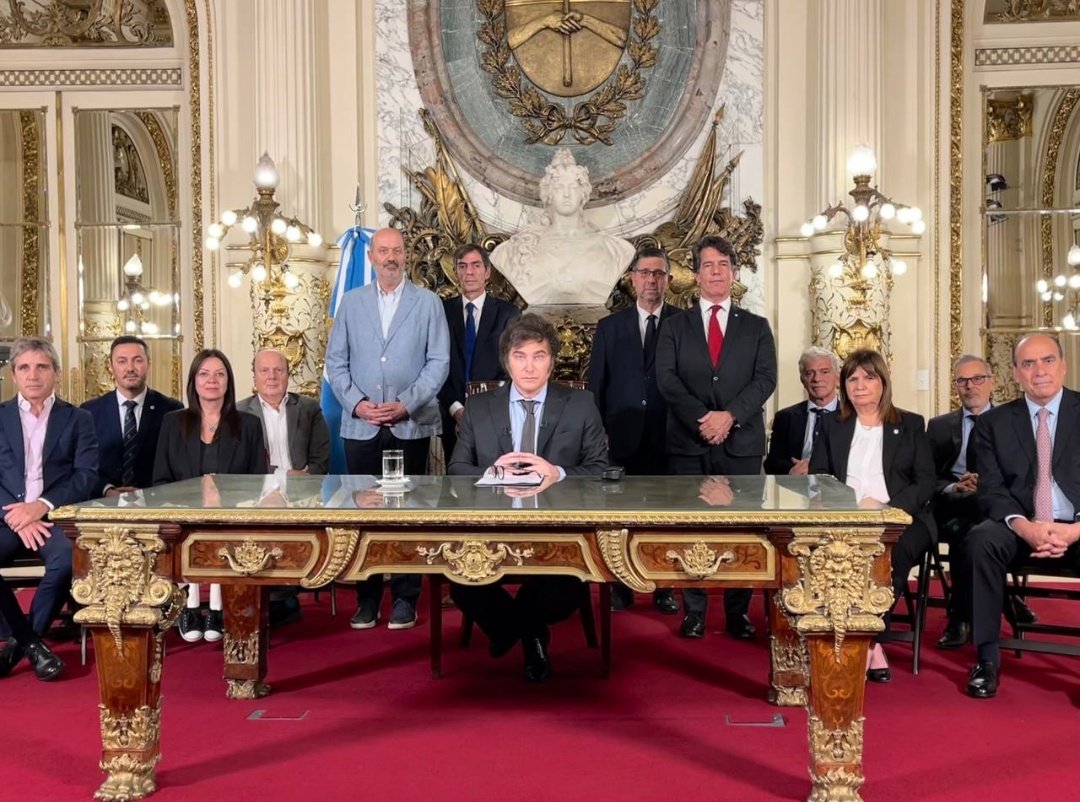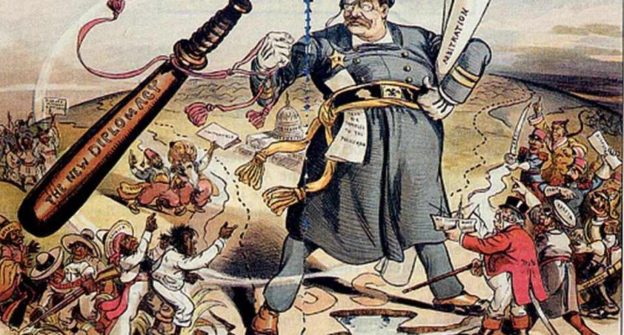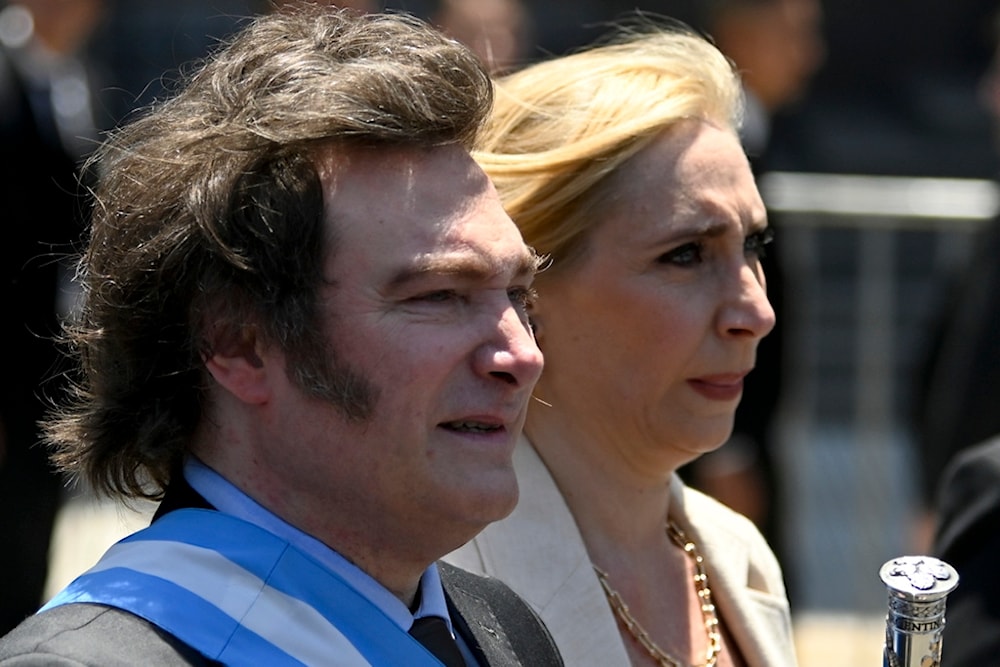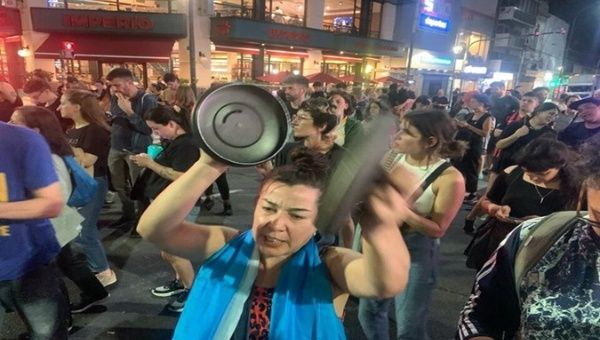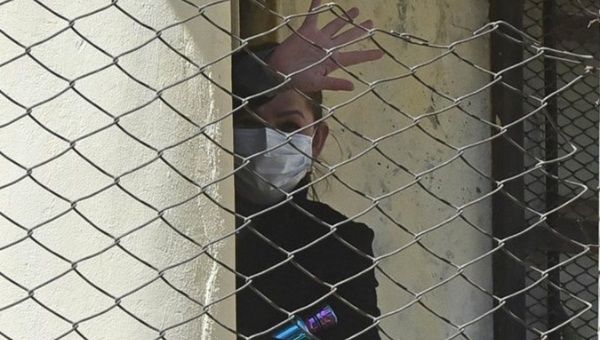Don’t Cry for Argentina. It Is Not Worthy of Your Tears
Stephen Karganovic
November 22, 2023
Argentina has made its choice and now it must bravely face the consequences of its own making, Stephen Karganovic writes.
The Argentine runoff Presidential election has produced a result that many who still care for Argentina will regard as regrettable. But there are also bound to be not a few level-headed observers who will regard the outcome as somewhat suspicious.
The apparent winner is an oddball “Libertarian” politician, Javier Milei. Being an eccentric and a loose cannon, Milei is difficult to classify ideologically. He appears to be enthusiastic about cloning his deceased dogs, and he himself seems to be a cloned personification of the most obnoxious aspects of the American Libertarian movement. Libertarianism in its inspiration happens to be as parochially North American as the Mormons in the domain of religion and just as shallow in terms of philosophical substance. It remains to be seen whether Milei will prove to be a consistent ideologue of the nebulous Libertarian doctrines he professes, in which case the Requiem for Argentina should begin to be composed without delay.
If, however, Milei has even one pragmatic bone in his body he will be obliged very soon after his inauguration in December to go into reverse gear or face the wrath of the public that he has deluded with his irresponsible messianic promises.
Even worse for himself, for his political buffoonery he may also be obliged to face punishment from Argentina’s still vibrant armed forces, which have a respectable record of intervening to rein in wayward civilian politicians, though not necessarily always displaying as well the skills required to straighten out the messes the former had left behind.
There is no doubt that Argentina is currently very deep in one of those imbroglios into which it cyclically descends. The solutions offered by the charlatan were wisely rejected by its citizens in the first round of the elections, restricting Milei to about 30% of the vote. But Milei’s runoff rhetoric must have been irresistibly persuasive. In the second round he went on to garner a remarkable 55% of the vote (prompting the reasonable question of whether the popular Dominion vote counting machines, after their stellar performance in 2020, may have ended up in Argentina).
One of Milei’s brilliant solutions, abolishing the Argentine peso and replacing it with the U.S. dollar, may soon come to haunt the Argentine people. It would be interesting to hear Milei’s explanation of how doing away with the national currency, fragile as it may be yet always capable of recovery given the application of correct financial policies, and under the control of the issuing government, while replacing it with a declining foreign currency under the control of outside interests, would help remedy Argentina’s problems. Does Libertarian ideology allow for national sovereignty? Is Milei informed that not too long ago Ecuador discarded its national currency in favor of the dollar, but that for the Ecuadorean people the experiment on the whole resulted in more economic discomfort than benefit? Why now should the outcome be different in Argentina, and that at a time when the dollar is losing its reserve currency status and rapidly declining in value, far more so then when Ecuador was led down that primrose path?
Moreover, has Milei, who is reputed to be an economist, noticed a global financial trend which a repentant Jeffrey Sachs has called by its correct name, “dedollarisation,” and has that conspicuous trend had any impact on his thinking and choice of cures for Argentina’s financial ills? There is scant evidence that it has or that the warnings of sober economic experts have influenced the formulation of the policies that Milei has proposed. At the end of the day, with their new junk currency in hand, Argentines may remember with nostalgia their present inflation of mere 143%. Just as probably, they may come to regard with wrath the Pied Piper many of them had voted for.
Nor does Milei appear to be aware of the other major collapse that is taking place in the contemporary world, that of the unipolar system to whose imperilled currency he wishes to tie his country’s fortunes, suggesting that, indeed, El Clarín may be his chief source of political information. Contrary to every postulate of prudence (and some would argue of common sense as well) Milei has announced that as President he intends to reverse Argentina’s membership in BRICS. Public commitment to this politically counterintuitive policy goal suggests that Milei may be more than just an eccentric Libertarian enthusiast and that in fact he may be a figure purposefully inserted into the global game to promote a much more serious and disruptive geopolitical agenda.
There are very few today who recall that Argentina has not always been the Sick Man of the Pampas and that over a hundred years ago in economic strength and attraction it rivalled the United States as the destination of choice for European immigrants. Its once brilliant prospects came to nought as a result of the combination of the corruption and foolishness of its elite and idiocy of its pampered populace.
Argentina’s decline and fall has mirrored in many ways the downfall of Ukraine, formerly one of the Soviet Union’s most progressive and prosperous republics. Argentina, like Ukraine, was thrown under the bus by its greedy elite, also acting from selfish motives of short-term material gain and also placing itself in a condition of voluntary subservience to foreign, in Argentina’s case mainly British, patrons and their dazzling culture. The bamboozled populace followed suit in its own ignorant way.
The tribulations of both countries, far from being the outcome of objective necessity, are the avoidable result of foolish choices made jointly by the ruling elite and their equally irresponsible subjects.
Whatever vote counting machines may have been used, Argentina apparently has made its choice and now it must bravely face the consequences of its own making. There is no particular reason to shed tears for it any more than there is to cry over the tragic fate of its suicidal mirror image in Eastern Europe.
https://strategic-culture.su/news/2023/ ... our-tears/
******
What will happen to the Argentine economy under the new president?
November 24, 2023
Econopocalypse

The situation in Argentina, where the flamboyant showman Javier Miley came to power, is causing serious concern among the expert community. Even during the time of President Mauricio Macri , multinational corporations gained almost complete control over the Argentine economy and led it to a state of cyclical default.
Unsustainable loans from the IMF, fully “mastered” by IMF officials, representatives of TNCs and government corrupt officials, do not allow the development of the economy. The financial scam, as a result of which in 2018 the IMF provided Argentina with a loan totaling approximately $57 billion, of which $44 billion was actually paid, was the source of current serious problems. In addition, Macri's policies led to the closure of 30,000 small businesses, a 500% devaluation of the national currency, increased tariffs for electricity, water and gas (by an average of 3000%), and reductions in budgets for health care, education and science. This created the foundation for current events, which can appropriately be called the complete loss of economic and political sovereignty.
Visionary economic ideas of Javier Miley
The most interesting statement of the recently elected President Javier Miley is the initiative to liquidate the Central Bank of Argentina and replace the national currency (peso) with the US dollar.
According to the latest data from the Argentine central bank, analysts participating in the Survey of Market Expectations (REM) have raised their forecast for the annual inflation rate for the current year to 185.0%. This marks a revision to the forecast from the previous month, when it was 180.7%. The survey, conducted between October 27 and October 31, involved 38 representatives of consulting companies, financial institutions, as well as local and international research centers. Analysts agree that monthly inflation in November will be 11.5%.
The situation is, to put it mildly, catastrophic. Such a high level of inflation does not allow us to count on trust from the population and the business community. Any president who finds himself in such a situation has practically no options for influencing the economy using classical methods. At this level of public debt and inflation, economic activity can only be revived using external resources. Therefore, statements about the liquidation of the Central Bank, at the suggestion of American curators, simply state the fact of the death of the country’s financial system .
In Argentina , the formation of a parallel financial system based on Tether (USDT) has been underway for quite some time . It is this stable coin that is becoming dominant not only in the financial system of Argentina, but also in other Latin American countries. As the share of USDC and local currency settlements in the market falls, much of this capital flows into Tether (USDT).
Today, up to 900 wholesalers and 50 retailers in the Buenos Aires Central Market will be able to accept USDT through the IP service provided by KriptonMarket .
The stablecoin Tether is being promoted in Argentina as a solution to combat inflation and a way to facilitate digital payments between small producers and end consumers by reducing transaction costs.
An interesting comment from Paolo Ardoino, technical director of Tether:
“We hope that the implementation of Tether for entrepreneurs and small businesses in Buenos Aires can be an example that can be scaled around the world. With the national currency constantly devaluing, Argentines need solutions that allow them to gain financial freedom . If we can contribute to the well-being of an entire country through the advanced technologies offered by blockchain, this will be another step in the fight against financial discrimination .”
The wording itself is important here. The blockchain project is promoted as a way to gain freedom, and the classical banking system is identified as a source of financial discrimination.
Additionally, the collaboration between Tether and KriptonMarket includes the launch of training courses throughout Buenos Aires to inspire a new generation of blockchain enthusiasts and business professionals.
We have already examined in some detail the impact of USDT on the Brazilian economy . Based on this analysis and Miley’s current populist statements, it is highly likely that we are not talking about a transition to the dollar in the classical sense , although this is exactly what the majority of the population thinks and hopes. Rather, the idea is to increase the share of USDT in the country's financial system. This is the digital equivalent of a dollar, but not a dollar . This is a stablecoin issued by a private company. Naturally, its emission and circulation are under the control of US intelligence services. Moreover, there is always the possibility of forced conversion of accounts/deposits in USDT into the digital dollar USDC, which will already have the full functionality of programmable money.
Right now, blockchain technology, under the control of US intelligence agencies, is being used to dismantle the financial system throughout Latin America. The ultimate goal is to deprive the countries of the region of financial independence, which in the near future will provide ample opportunities to discredit governments and completely dismantle the state management system.
Shock therapy as a tool for introducing unconditional basic income
Other statements by Miley concerned the reduction of the state’s presence in the economy, shock therapy, and the exclusion of education and health care from the state financing system. We are talking about optimizing costs in the social sphere and the transition to uncontrolled market relations. All residents of the post-Soviet space experienced this in the 90s. But the population of Argentina does not yet have such experience and, perhaps, hopes for the best, listening to the speeches of another populist. This phenomenon can easily be explained by the degradation of the education system and the complete control of the media by TNCs.
With the help of Miley, the globalists have now dealt the main blow to the financial system with the aim of further introducing the mechanism of unconditional basic income and social rating . Although Miley blames socialists for all the problems, it is their experience of distributing goods in society that underlies the social rating system. Shock therapy, according to Miley, means that some competitive enterprises and specialists will be integrated into the Anglo-Saxon economic circuit.
But there are very few such enterprises and specialists. No more than 3-5%, estimated. The remaining enterprises, which Macri began to clean up, will naturally not survive. The same applies to Argentine specialists who are deprived of access to the American and European professional training systems. Accordingly, they will experience serious problems with employment both in enterprises bought up by TNCs in Argentina and outside the country.
All this will raise the question of introducing an unconditional basic income and social rating for the population as the only workable option. Argentina, which the globalists deliberately brought to bankruptcy, will now be used as one of the testing grounds for testing a new control system on living people in real conditions.
Possible privatization of oil and gas enterprises in Argentina
The issue of privatization of enterprises in the oil and gas sector of Argentina was voiced, but postponed to a later date. Now, in all likelihood, US oil and gas giants are auditing enterprises and assessing the level of investment required to increase capacity.
For the second quarter of 2023, the state oil company showed a profit of $380 million, which is 51.3% lower than for the same period in 2022. Such a sharp drop in profits is primarily due to inflation of the local currency, the peso. But the company's revenues fell by only 12.4% year-on-year. With additional investments, the profits of Argentine oil and gas enterprises can increase many times over, making them a valuable asset for TNCs.
Natural resources of Argentina
Argentina received its name from the Latin argentum - silver. It was this metal that was the basis of the colonial economy since the conquest of the country by the conquistadors. At the current stage, only technologies change, but not methods. Argentina has reserves of iron ore, uranium, lead, zinc, copper, manganese, tungsten, lithium and other minerals.
An extremely interesting asset is the agro-industrial complex. Meat production was successfully privatized by structures affiliated with the Soros Foundation. But arable land and drinking water supplies are also of interest. Companies such as Monsanto and Nestle have a long and active presence in Argentina. Now they have a real chance to get closer to a monopoly position in the local market.
Appointment of a showman to cover up the activities of TNK
Such a shocking and energetic personality as Javier Miley is ideal for diverting public attention from the activities of TNCs in the country and in the region. Since his election, the media has been filled with his speeches, often of a very provocative nature. In the meantime, all the attention of the population and the media is switched to the show, you can safely liquidate the financial system and conclude contracts on enslaving conditions. In the near future we will witness very unpopular decisions that will be made precisely in the interests of TNCs.
Miley's unexpected sympathies towards Israel and the USA
A lively discussion was sparked by the initiative to move the Argentine embassy to Jerusalem, the decision to visit Israel, and open support for the policies of the United States and Israel both in the Middle East and in general.
To understand the situation, it is necessary to clarify some details. Miley came to power because he has the support of representatives of Chabad, an ultra-Orthodox and influential religious movement in Judaism. For him, joining the Chabad ideology turned out to be a very forward-thinking approach. Instead of the usual visits to the Biden administration, the UN or the IMF, the Argentine politician chose Israel as the location of his inaugural visit.
In a recent interview with local television, Miley articulated his particular religious orientation this way: “I abandon traditional church attendance in favor of synagogue, where I actively listen to the teachings of the rabbi and immerse myself in the wisdom of the Torah. My global reputation as a steadfast friend of Israel is a testament to my commitment.” He regularly attends classes with Rabbi Shimon Wachnish, leader of the Argentine-Moroccan Jewish community in Buenos Aires. Miley speaks warmly of his mentor, noting, “Rabbi Vachnish is a trusted confidant with whom I consult regularly. Our long and deep conversations, sometimes lasting two or three hours, make a significant contribution to my personal development and deepen my understanding of the circumstances.”
Against this background, all of Miley’s statements about the foreign policy that he is going to pursue take on very specific outlines. It is obvious that he will act exclusively in the interests of the Anglo-Saxon elites, influenced by various religious movements of Judaism.
Argentina, sanctions against the Russian Federation, and BRICS membership
Miley’s statements regarding sanctions against the Russian Federation, refusal to participate in BRICS, friendship with the United States and Israel are a good information operation aimed primarily at causing a split in the group of countries that do not share the “democratic values” of the Anglo-Saxons.
Events in Israel showed that the United States, Great Britain and Israel found themselves virtually in information isolation on key issues of the current conflict. It is now critical for them to gain public support outside their community to give legitimacy to their actions.
As for Argentina's sanctions against the Russian Federation, it is difficult to imagine that, against the backdrop of tens of thousands of sanctions imposed, the Argentine president is able to generate something fundamentally new and provide a mechanism for implementation. Rather, we are talking about developing theses that the curators from the USA kindly asked to voice.
Argentina could initially participate in BRICS only as a recipient of assistance from other donor countries. Investments are required to develop any projects within the country or abroad. But even if they were provided, these funds would be used in full to repay the IMF debts. In order for effective activities within the BRICS framework to become real for Argentina, it is necessary to completely disconnect the country from the American financial circuit. But when the not very positive example of Venezuela is before your eyes, and the country’s financial system is practically paralyzed, it is difficult to find weighty arguments for such a decision.
Overall, the situation for Argentina is now developing within the framework of the regional governance template formulated by Franklin Roosevelt in 1939. In any case, the phrase is attributed to him: “Somoza ( Anastasio Somoza ) may be a son of a bitch , but he is our son of a bitch .” It is this format that makes it possible to promote unpopular decisions in the interests of globalists, under the guise of a show.
https://rybar.ru/o-perspektivah-ekonomiki-argentiny/
Google Translator
**********
NEITHER ANTI-SYSTEM NOR ANTI-POLITICS
WITH MILEI "LA CASTA" ENJOYS POLITICAL PROMINENCE AND GOOD HEALTH
Nov 23, 2023 , 10:33 am .

Javier Milei's anti-system speech is a smokescreen to cloud the impunity that those around him have experienced (Photo: Archive)
The elected president of Argentina, Javier Milei, promised during his electoral campaign to free himself from his country's political class, which he has called "the caste", however, some early decisions indicate the opposite.
Argentina has gone through different political-economic cycles that have led to processes of accumulation of power in favor of national and global financial elites. The banks define their course and this has been achieved through neoliberal adjustments such as those implemented by the then president Carlos Ménem (1989-1999), as well as with Mauricio Macri (2015-2019), in agreements with transnational blocks and institutions that have participated in the deconfiguration of the State.
Seeking to relaunch that process, Milei said that he will seek to privatize the national oil company Yacimientos Petrolófilos Fiscales (YPF) , as well as public media such as Public TV, National Radio and Télam. After his victory, the self-proclaimed libertarian led a campaign of radio interviews, where he defined his desire to sell state companies.
In addition to anticipating that he will travel to the United States and Israel before assuming the presidency, he assured that "everything that can be in the hands of the private sector, will be in the hands of the private sector." This phrase is a play on words that recalls the famous Ménem operator, Roberto Dromi, who in the privatization attack of 1989 announced "erroneously" that "nothing that should belong to the State will remain in the hands of the State."
As a result of that "lapse", the Argentine State was decapitalized, the billions from the sale of the companies were not used to end the burden of the external debt, but rather served to sustain, in a strong debt process, the flow of dollars that would guarantee the convertibility experiment.
After the first round for the presidential election, there was a process of symbiosis between Milei's political group, who had the second most votes, and the candidate of Together for Change, Patricia Bullrich, who was left out of the runoff and was sponsored by Macri. . This closed Milei's flurry of insults against that sector of "the caste" and reconfigured the political map to the detriment of Peronism and sectors of the Radical Civic Union.
However, beyond the verbal, Milei has begun to announce names for his cabinet. These are not new faces, as will be seen below.
NICOL ÁS POSSE WILL BE HIS CHIEF OF STAFF
In 2007, he joined Corporación América, the company of Eduardo Eunerkián, owner of a conglomerate that includes airport concessions, agricultural companies and media companies. Posse stood out as CEO responsible for Duty Free at the magnate's airports and was then in charge of project management in the failed "Aconcagua Bioceanic Corridor" between 2009 and 2017, an initiative to unite the Atlantic and Pacific oceans through a high-tech rail corridor.
In 2016 he assumed management of the El Palomar Airport, where he was able to expand his experience in the airport field and, together with Milei, explored the Chilean public works financing system. This shared experience became the basis of his political desire, leading them to attempt to replicate and adapt the model in Argentina.
During the campaign, Posse was director of technical teams and political strategist, he was in charge of organizing key areas such as Education, Health, Energy, Mining and Housing. His role was central in the "political assembly" of La Libertad Avanza (LLA), channeling economic contributions and being the link to finance the campaign.
A PRO CARD ON THE "SMALL TABLE": SANTIAGO CAPUTO
By "small table" we mean the environment closest to the president-elect. In his speech after the election results of Sunday, November 19, the engineer Santiago Caputo was named by Milei before his vice president Victoria Villarruel for being considered the architect of the victory in the elections.

Nicolás and Luis, uncles of Santiago Caputo, were at the center of power during the Macri administration (Photo: Archive)
Caputo joined the LLA campaign in 2021 and became Milei's right-hand man. He worked with Macri's "guru", the Ecuadorian Jaime Durán Barba, operator of two offshore accounts in the British Virgin Islands. His family environment revolves around Macriism, he is the nephew of Nicolás and Luis Caputo, allies of the former president who created the megadebt with the IMF and son of the former president of the College of Notaries of the city of Buenos Aires, Claudio Caputo.
Nicolás "Nicky" Caputo is the owner of the technology company Mirgor, co-founded with Macri, and Luis "Toto" Caputo, the former Macri Finance Minister, who was nicknamed "the Messi of finance" and ended his administration with a void of US dollars. the reserves.
On the other hand, Flavio, Hugo and Rossana Caputo, other relatives of Santiago Caputo, were involved in financing Jonathan Morel, one of the co-founders of the violent organization Revolución Federal (RF). Morel's services as a carpenter were hired from his construction company and the million-dollar payments they made coincide with RF attacks on political leaders, including Cristina Fernández de Kichner.
Morel is being prosecuted for inciting collective violence along with Leonardo Sosa, the other co-founder of the organization that threatened the former president.
Santiago Caputo worked with Santiago Nieto and Roberto Zapata, two PRO men who worked closely on the Cambiemos campaign in 2015.
DIANA MONDINO: THE NEXT CHANCELLOR IN FAVOR OF HANDING OVER THE MALVINAS
The future Argentine chancellor is Diana Mondino, who compared homosexuality to "having lice." The economist, who also proposed privatizing public works , among other State tasks, was part of the board of directors of large companies such as Pampa Energía, Standard & Poor's and Loma Negra, always in the private sphere.
Página/12 reports that, despite his privatizing spirit, Mondino graduated with a degree in Economics from the National University of Córdoba and has training in companies and business in both Spain and the United States. She endorsed on several occasions the "self-determination" of the inhabitants of the Falkland Islands , in line with the historical British position.
In relation to the latter, last September he declared to The Telegraph that "no decision can be imposed on other people, neither on Argentinians nor on anyone. Decisions can no longer be imposed, that has to end." He added that "the decision of the locals" can only be qualified if the Argentine government "seduces" the islanders with concessions to the British, such as leaving open the possibility that Great Britain "can make reasonable use of the resources it there down there."
He has also repeatedly defended the creation of an "organ market" aligned with the work of Nobel Prize winner in Economics Alvin Roth, who in 2012 was recognized for developing an algorithm to streamline the cross-transplant system. This was implemented in the United States, allowing 30 patients to receive kidneys from 30 unknown donors for four months in 17 hospitals in 11 states.
However, in 2018, the Council of Europe vetoed the implementation of the United States-driven system of "global kidney exchange" because they denounced that it hid the "trafficking in human organs" and encouraged the "risk of exploitation" of highly vulnerable individuals.
SOCIAL SECURITY: "STRONG HAND" WITH A HISTORY OF BRIBERY
The workers' pensions will be under the administration of Carolina Píparo, a 47-year-old social worker who was elected provincial deputy in 2017 and joined the ranks of liberalism in 2021, after being expelled by the PRO as a result of the scandal in which she was involved . to her husband, after running over two motorcyclists in La Plata in 2017 and trying to bribe them.
She will be the head of the National Social Security Administration (Anses), the body with the largest budget in the State. She entered politics in 2010 after an assault while she was pregnant, since then she became strong in the "iron fist" agenda.

In charge of social security will be Carolina Píparo, accused of bribery along with her husband (Photo: File)
Second on board would be Juan Manuel Verón, Investment Director at Principal Financial Group (PFG), a multinational company in Mexico. He participated in the last reform of that country's pension system and is expected to be the "brain" of social security policy in Argentina for the next four years.
The Mexican pension reform validated the appropriation and use of the savings of that country's workers in the hands of financial entities. Many of these businesses are oriented towards transactions with the "Mexican State" itself, with the purchase of public bonds.
The adjustments made by the outgoing Argentine government resulted in the vulnerability of some 5.5 million retirees (73%) who receive the minimum allowance , whose final assets are made up of other income (bonus of 55 thousand pesos, Pami food benefit, etc. .) that the new government could not renew in January 2024.
INTERNAL POLITICS (AND THE POLICE) BY A VETERAN OF "THE CASTE"
Guillermo Francos will head the Ministry of the Interior. He worked at the Inter-American Development Bank as a director. He is an omnipresent public official in Argentine history: during the dictatorships of Roberto Marcelo Levingston and Alejandro Agustin Lanusse, between 1970 and 1973, he served as private secretary of the Ministry of Justice, in the administrations of Jaime Perriaux, Ismael Bruno Quijano and Gervasio Colombres. .
He then worked as a lawyer in the Department of Legal Affairs of the Ministry of Justice under the presidency of María Estela Martínez de Perón between 1974 and 1976, and between 1976 and 1985 as Director of the National Institute of Educational Credit.
Towards the end of the 1980s, he presided over the Federal Party, after the death of its founder, Francisco "Paco" Manrique, and in 1996 he founded the Action for the Republic party together with Domingo Cavallo, father of "one to one" (1 peso for 1 dollar) that caused damage to the national industry and ended in a deep debt crisis. This is one of the economists most admired by Milei.
In 1985, Francos was elected councilor of the Federal Capital until 1993, he was a national deputy between 1997 and 2000 and president of the Bank of the Province of Buenos Aires during the governorship of Daniel Scioli. He is emerging as the political operator who will carry out the negotiations with the governors and build the necessary bridges for the approval of laws.
Economic policies would cause social upheaval, as has already happened in Argentina. To deal with this, Macri has already described the protesters as "orcs" and has announced that they would encourage social confrontation. This will be the task of Francos, who will be in charge of the security forces.
In addition, the vice president-elect, a denier of the disappearances and torture of military dictatorships, will supervise the areas of Defense and Internal Security.
A MEDIA AND CRIMINAL LAWYER IN THE MINISTRY OF JUSTICE
Mariano Cúneo Libarona began his foray into the media when he defended Guillermo Cóppola in the case of the vase with drugs , in the 1990s. He also defended Carlos Ménem's brothers-in-law, Amira and Emir Yoma, in cases involving drug trafficking and trafficking. of weapons, particularly in the investigation into the illegal diversion of Argentine weapons to Ecuador and Croatia. The lawyer was detained preventively following a complaint from Lourdes Di Natale, who, in addition to being his ex-wife, was Yoma's secretary.

Cúneo Libarona is not a new face: he belongs to a traditional family of lawyers, has handled shady cases and has been imprisoned for cover-up (Photo: Archive)
Di Natale, who died in 2003 in a confusing episode where he fell from his apartment on the tenth floor, said that Yoma had paid 400 thousand dollars through the arms seller Diego Palleros to the Daforel company.
In the case of Amira Yoma, the media criminal was her legal representative in her accusation in the " Yomagate " or "Narcogate", a drug trafficking trial that was unleashed from a notebook found in the arrest of the accountant Ramón Humberto Puentes in Uruguay , where among other names the president's sister-in-law appeared as responsible for transporting a "cargo" from New York.
Also in the late 1990s, Cúneo Libarona was imprisoned for a month after being accused of aggravated coercion and cover-up in the case investigating the theft of a video from Judge Juan José Galeano's office. In the context of the case in which the attack on the AMIA was investigated, the lawyer represented two police officers accused of the theft, who were finally acquitted and everything was declared void. The judge and the judge's secretary in charge of the investigation were arrested.
He is one of the trusted lawyers of businessman Eduardo Eurnekian and Milei's former co-worker , however there are many doubts in the legal environment regarding the lawyer. He participated in the trial for the Time Warp tragedy , an electronic music party where five young people between 20 and 30 years old died and dozens had to be hospitalized (six of them in intensive care) due to the consumption of adulterated synthetic drugs. . Cúneo Libarona, together with Fernando Burlando and Matías Morla, were in charge of defending those responsible for the event: Adrián Conci, Facundo González and Víctor Stinfale.
His law firm defended Giselle Rímolo , now called Mónica Cristina María Rímolo and ex-partner of a famous driver, Silvio Soldán. The accused presented herself as a nutritionist, homeopath, psychologist and specialist in alternative therapies and in 2012 she was sentenced to nine years in prison for manslaughter, illegal practice of medicine, fraud on more than 70 occasions and trafficking in dangerous medications.
In addition, Cúneo Libarona was a defender of the businessman Sergio Taselli, noted in the "bribery notebooks" of Oscar Centeno, driver of the official Roberto Baratta. Taselli was arrested by Judge Claudio Bonadío when he appeared to testify, but was later released from prison.
"THE BREED" IS IN GOOD HEALTH
In fact, Milei's anti-system speech is vacuous; Her ties inside and outside the government she is about to form are aligned with actors and structures that have corporatized Argentine politics. Her notion of a "strong hand" and her verbal histrionics are apparently a smokescreen to cloud the impunity that those around her have experienced.
His libertarian theses to get Argentina out of the serious economic crisis it is experiencing predict another stage of it, just as his promise to remove the entire ruling class that governs the country is just a reconfiguration of forces to put a tired society to the test. service of the same local politicians and transnational powers.
Milei means an opportunity for the technocratic detritus that requires seizing public funds in order to sustain a model in full collapse.
https://misionverdad.com/globalistan/co ... uena-salud
Google Translator
******

Atilio Borón | Facultad de Derecho
Argentina: Milei’s triumph was a neatly planned media construction
By Atilio Borón (Posted Nov 23, 2023)
Originally published: Resumen: Latinoamericano and the Third World on November 20, 2023 (more by Resumen: Latinoamericano and the Third World)
As usual in terms of political or electoral analysis in Latin America and the Caribbean, a few hours after Javier Milei’s victory in the Argentine presidential elections, we conducted an exclusive interview for Correo del Alba, with Atilio Boron, the renowned political scientist and intellectual with whom we reflected on the triumph of the extreme right.
Correo del Alba: Milei is what is known today in the political field as an outsider, what happened to this controversial figure, supported by young people, mostly men, who rose like foam? Did the old Peronist guard not see it coming? Is it responsible for the results of this November 19?
AB: Let’s go by parts. First, Milei was an outsider in the political field, but not in the media. Mariana Moyano, the journalist who unfortunately disappeared a few weeks ago, verified that he was the most consulted economist by radio and TV programs in 2018. According to this source, in that year he was interviewed 235 times and had 193 thousand 547 seconds of air time. No character in political life even comes close to these figures, and the same happened in subsequent years. In other words, it was a neatly planned media construction.
Second, the role of youth, the main victim of the process of informalization, “desalarization” and labor precariousness. The segment between 18 and 29 years of age, a total of eight million 337 thousand 914 people, represent 24.29% of the national electoral roll. To the above, it is necessary to add one million 163 thousand 477 young people between 16 and 17 years of age who are eligible to vote. At the national level, this age group represents only 3.3% of the total electoral roll, a proportion almost equal to that of the province of Entre Ríos. Therefore, we are talking about a little more than 27% of the electorate formed by young people who found little or no incentive to vote in favor of the pro-government candidate, or who had little to no memories of the events of December 19 and 20, 2001 and even of the golden age of Kirchnerism. They were not enamored by the official proposal, something that was evident even to a blind man just by comparing the youthful fervor of Milei’s events -carefully staged, no doubt; but suitable to arouse the enthusiasm of young people-, with the packaging and the lack of enthusiasm that prevailed in almost all the events organized for Massa by the Frente de Todos apparatus.
To conclude with this question, it is obvious that the old Peronist guard, self-absorbed and entrenched in the defense of its corporate and sectorial interests, has not seen what is coming for a long time, nor does it show the least understanding of what contemporary society is and how it works today.
CA: How much of what Milei promised in his campaign is possible to achieve in Argentina today?
AB: It is difficult to make a forecast. There are areas in which social resistance, spontaneous, from below, will be very strong. I am thinking of the case of the attempt to advance in the privatization of social security, given the catastrophic experience of the AFJP around the world. In others, perhaps not so much, for example, if the object of such policy were Aerolíneas Argentinas; but there could also be surprises there. With YPF, the matter will be much more complicated, because the provinces are the owners of the subsoil wealth, and this would imply opening a debate of difficult prognosis for the Government given the composition of both chambers of the Congress. In short: it will be necessary to see case by case and measure in each instance the prevailing correlation of forces.
There are many factors that influence this disparity of reactions. One, the fact that a good part of the social organizations and party forces are very weakened and delegitimized. Two, the decomposition of the popular universe, fragmented in a myriad of labor situations marked by absolute precariousness, the lack of union representation and the total absence of protective legislation that benefits an increasingly minority sector of the economically active population. Three, the struggle within the heterogeneous dominant bloc where the fractions linked to financial speculation have a greater gravitation than those anchored in industrial production and even in agribusiness. The variable results of this dispute between fractions of the ruling classes will be very important when it comes to facilitating or hindering the fulfillment of the new president’s campaign promises.
CA: Is Milei a paradigm shift that represents more the youth that has been forming accompanied by social networks that circumscribe reality to their interests nothing more?
AB: He is an emergent of that situation of extreme vulnerability of a youth brutally hit by the pandemic and quarantine and, moreover, by an economic policy that deepened economic and social exclusion and increased poverty to unprecedented levels, except for the brief hyper inflationary episodes of May-July 1989 and January-March 1990. For this social category, the experience of the government of Alberto Fernández and his Minister of Economy, Sergio Massa, was an unmitigated disaster. For these young people there were neither economic policies for the repositioning of wages (except for a minority, and thus insufficient), nor an epic that would allow them to conceive themselves as militants of a national cause, and much less a communicational apparatus that would strengthen their claims while making the voice of the rulers heard. The result: an almost massive rush towards someone who, astutely, was presented by the dominant powers as fresh, youthful, novel, despite being a 53 year old man. Surprising? Not for those of us who study the role of social networks, algorithms and the new techniques of political neuromarketing. Or for those of us who, like me, have been preaching in the desert the need to wage the battle of ideas to which we had been summoned by Fidel since the end of the last century and which the left in general as well as the national-popular movement irresponsibly underestimated. The result: triumph of “anti-politics”; identification of the “caste” and the State as predatory agents while hiding the role of the bourgeoisie and the ruling classes as agents of collective exploitation; exaltation of hyper-individualism and its correlate, abandonment if not repudiation of collective action strategies and class, territorial or labor organizations, trusting in individual “salvation” and condemning those who participated in collective protests, all for the benefit of the irrational exaltation of a skillful demagogue sponsored by the most concentrated capitals.
In view of this cultural configuration, it was almost impossible, especially with inflation hovering around 13% or 15% per month, that a Minister of Economy responsible for this situation could win in the elections. In view of this background, the vote that Massa did acheive is truly astonishing.
CA: Will he be able to put an end to the Welfare State that has characterized Argentina since the middle of the last century with Perón and Evita?
AB: It is partly answered in the first question. But we must add to the Argentina of Perón and Evita the important economic and social advances during the years of Kirchnerism, although it is evident that however praiseworthy these may have been, they were insufficient to successfully confront the ravages that capitalist accumulation produces throughout the world and most especially in a country with a State as weak and inefficient as Argentina.
Note that, as assured by a report of the Central de Trabajadores de la Argentina (CTA), between 2016 and 2022 the transfer of income from labor to capital amounted to 87 billion dollars, of which 48 billion dollars were transferred in 2021 and 2022, years in which a “national and popular” coalition governed. The result: a very serious deterioration of wages, which, in the formal economy, are even below the poverty line. Could anything else than the frustration and anger of broad sectors of the electorate in the face of this painful economic reality have been expected? What antibodies did they have to avoid being seduced by a nonsensical discourse, full of absurd myths (such as, for example, that Argentina at the beginning of the 20th century was the richest country in the world, among many other nonsense!), but which vociferated the need to put an end to an intolerable situation, leaving aside everything old and execrating a supposed “caste” that, for its own benefit, had condemned them to poverty and destitution?
CA: How does he visualize the opposition to Milei, will there be a movement to watch over his program?
AB: It will depend on the reorganization and rearticulation of the popular camp, on its concrete proposals of struggle, on the character of its defensive strategy before the foreseeable attacks of a government obsessed with cutting labor and social rights and provoking a maxi-adjustment of the economy. It also depends on the emergence of credible leaderships endowed with great convening power, capable of attracting the millions of people plunged into misery and insecurity by the unlimited voracity of capital.
The party system has collapsed and, even worse, the political forces and identities that marked a large part of Argentine political life since the middle of the last century and up to a few years ago -radicalism and Peronism- have entered into a crisis of unprecedented proportions. They will probably reappear, in a neoliberal key and under mutant and, probably, aberrant forms that will have little or nothing to do with the DNA that constituted them.
The organic radicalism faded away and its voters threw themselves with all their strength to vote for someone who had grossly insulted the two most important leaders of that political force: Yrigoyen and Alfonsín. And the Peronism apparatus, and the voters of that current, only in a minority supported Massa’s candidacy. It is enough to see what happened in the provinces usually bastions of the Peronist vote (La Rioja, Salta, Tucumán, Chaco, Catamarca, Santa Cruz and, to a lesser extent, others) to prove that this electorate is already available for any demagogue or any copular arrangement decided by the groups that in each province took over that seal. Neither the Radicals nor the Peronists are today political forces with an organization, leadership and strategies of political struggle of national scope. They have fragmented into 24 parties, one for each province, and willing to negotiate their vote according to the circumstances.
“Neither the Radicals nor the Peronists are today political forces with an organization, leadership and strategies of political struggle of national scope.”
CA: How is and how will be Milei’s relationship with the Armed Forces?
AB: I think it will be very good. Vice President Victoria Villarruel is an unabashed apologist of the genocidal dictatorship, admirer of the dictator Jorge Rafael Videla and his cronies in the violation of Human Rights; she will be Minister of Defense and Security.
The reactionary political socialization of the Armed Forces, a task for which the Southern Command and the various treaties of military collaboration between the United States and Argentina play a very important role, will surely open the way for them to take charge of the repression that Milei’s ultraneoliberal policies will necessarily demand.
In line with what Patricia Bullrich said and did as Minister of Security of the Macri government, Milei will give the green light to the Armed Forces and the police to unload their repressive potential against the “enemy within” with total impunity. The “Chocobar Doctrine” was a protocol that enabled the federal forces to shoot without raising the alarm against any suspect, which implies a very serious setback in terms of respect for individual guarantees and the rule of law. It was left without effect by one of the first initiatives of the government of Alberto Fernandez, but unfortunately it seems that this doctrine will be back with the new government.
However, we will have to see how the security forces react when they have to face thousands of young people, women and children demanding justice, even though the lessons of Latin America’s contemporary history show that the confusion between internal security and external defense is usually the mother of very serious violations to Human Rights, as it happened in Mexico in the years prior to the government of Andrés Manuel López Obrador. In the United States or in European countries both functions are clearly delimited. The new Argentine government seems willing to take a gamble with more than obvious disastrous consequences. But, in this as in other issues, such as policies of cuts or annulment of rights, it would be a mistake to underestimate the reaction of Argentine society, which on several occasions has shown signs of opposing fierce dictatorships or savage economic adjustment plans. Argentine history offers numerous examples of resistance and although society has changed a lot in recent times, it would not be strange that this rebelliousness would reappear once again with volcanic force, even in the absence of appropriate organizational structures. The “Cordobazo” of 1969 and the popular insurgency of December 19 and 20, 2001 are specters that will undoubtedly disturb the dreams of those who seek to destroy the economic, social and cultural conquests that the Argentine people won through great struggles.
CA: How could Milei’s triumph, geopolitically speaking, affect the Region?
AB: First of all, it will harm Argentina, because, in line with Washington’s demands, it will turn this country into a battering ram to reduce China’s presence in the Region, even at the cost of harming Argentina’s national interests, its exporting sectors and the labor force linked to them. Milei’s is probably a “dream” victory for the North American establishment. because it finds in the south of the continent a fanatic willing to execute without question the slightest suggestions coming from Washington: staunchly anti-communist (in a definition of such vagueness that goes from Lula to Pope Francis, passing through China, Cuba, Venezuela and Nicaragua); unconditionally aligned with the Empire, justifier of the ongoing genocide in Gaza, admirer of the Israeli terrorist State and of the North American society, Milei from the Casa Rosada will encourage with his example similar behaviors among the leaders of the right wing of neighboring countries.
Perhaps, and again we must take into account the cleavages within the dominant bloc, he could go so far as to not only exclude Argentina from the Union of South American Nations (Unasur) and the Community of Latin American and Caribbean States (Celac), but even reject or postpone sine die the decisive incorporation of our country to the BRICS plus, which should take place on January 1st of next year.
In short, the crusade against the “Chinese enemy”, according to the documents of the National Security Council of the United States, has found its prophet in these distant and turbulent lands of the South. And, from the geopolitical point of view, with Milei in the presidency of Argentina, the gravitation in the international chessboard of Latin America and the Caribbean suffers.
https://mronline.org/2023/11/23/argenti ... struction/
********
Puebla Group Warns of Coup d’État in the Making in Guatemala
NOVEMBER 23, 2023
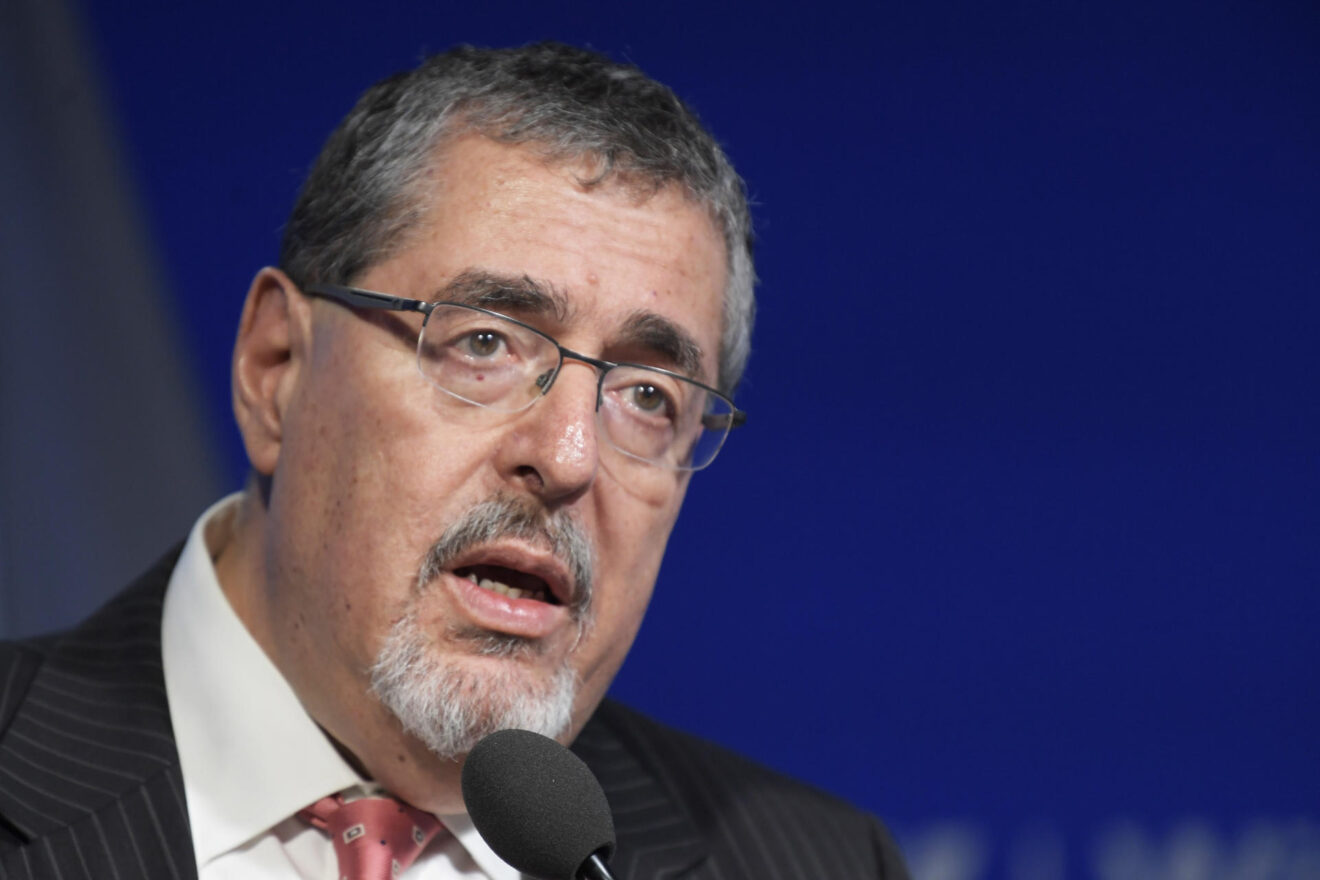
President-elect of Guatemala, Bernardo Arévalo. Photo: Lenin Nolly/EFE/file photo.
The member countries of the Puebla Group warned this Tuesday of a coup in the making against Bernardo Arévalo that seeks to prevent his inauguration as president of Guatemala in January.
In a statement published on its website, the Puebla Group stated that this coup attempt is promoted by “dark forces that govern the Executive Branch” as well as leaders of the judiciary of the Central American country.
“Although these forces want to change the people’s election, Bernardo [Arévalo] and Karin [Herrera] were elected on August 20 as constitutional president and vice president of the country, as confirmed by the Superior Electoral Court,” the statement reads.
It adds that, behind this conspiracy, are the Attorney General María Consuelo Porras and the head of the Special Prosecutor’s Office Against Impunity (FECI) Rafael Curruchiche “who, protected by President Alejandro Giammattei and some corrupt magistrates of the judiciary, are promoting legal warfare actions (lawfare).”
In the statement, the group highlighted the massive demonstrations that have been carried out in Guatemala for more than 40 days, especially by indigenous peoples, who are defending the results of the polls.
“We ask that the intimidation from the r’s Office against some sectors of the press, the opposition, students, and against members of the judicial branch and the public ministry who have acted independently cease definitively,” added the Puebla Group’s statement.
For this reason, the international organization requested the Latin American Council for Justice and Democracy (CLAJUD) to take the necessary measures to defend Guatemala’s democracy.
Last week, the Public Ministry announced that it would ask the Supreme Court to withdraw immunity against the president, the vice president-elect, as well as other deputies from the Semilla Movement party.
Arévalo unexpectedly won the presidential elections; some polls placed him as low as eighth position. He was the candidate for the Semilla Movement, a social democratic party whose main promise is to combat corruption.
https://orinocotribune.com/puebla-group ... guatemala/
